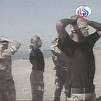 Amir Taheri has an excellent article on Iran's kidnapping of the 15 British sailors and Marines. His point is that this was no simple act of border defense, irrespective of whether the Brits had strayed into Iranian territorial waters.
Amir Taheri has an excellent article on Iran's kidnapping of the 15 British sailors and Marines. His point is that this was no simple act of border defense, irrespective of whether the Brits had strayed into Iranian territorial waters.
We may never know what actually happened. The area where the sailors were captured is at the mouth of the Shatt al-Arab, a border estuary that has caused two wars between Iran and Iraq since the 1970s. Iraq claims ownership of the entire estuary, while Iran wants it divided between the two neighbors. It is possible that the sailors thought they were in Iraqi waters while the Islamic Revolutionary Guard's Marines believed them to be on the Iranian side.Read the entire article here. Without going into extensive detail, I can attest, from my one year plus spent on the DMZ in Korea, of the accuracy of Taheri's description of how minor border are regularly treated between two countries without a clear border line and who are not in open hostilities.
What is certain, however, is that the sailors would not have been captured without Tehran's approval at the highest level. The Brits based in Basra have often strayed into waters that Iran regards as its own; Iranians have also often passed into Iraqi waters.
In other words, these are almost daily incidents. The standard procedure is to warn the trespassers and guide them back to their own side of the water. If that procedure was abandoned this time, the reason must be someone's desire to provoke an incident.
If trespassing were the cause of the incident, one wonders why the Islamic Republic turns a blind eye to American vessels often straying into its so-called continental-shelf territorial waters. A casual boat ride in the Persian Gulf would offer the visitor countless examples of this on a daily basis.
It is possible that the mullahs don't yet wish to provoke a direct clash with the United States, and have used the incident with the Brits as a means of testing the waters. They may also hope that they could force London to press Washington to release the Revolutionary Guard commanders held in Baghdad in exchange for the British hostages.
The mullahs' move cannot be fortuitous: The Brits were captured on the eve of a new Security Council resolution, drafted by Britain, to impose harsher sanctions against the Islamic Republic.
It also came after months in which the Western powers have been exerting what is known as "proximity pressure" on the Khomeinist regime. A former deputy defense minister of the Islamic Republic, Gen. Ali-Reza Askari (Asgari), was kidnapped or defected and is presumed to be in the United States. Five senior commanders of the Islamic Revolutionary Guard Corps, including its head of special operations, Gen. Mohammed Jafar Sahraroudi, remain under lock and key after having been arrested by U.S. forces in Baghdad.
Tehran is full of rumors about supposed secret contacts established by the Americans with several senior political and military figures with a view toward a regime change. The contacts supposedly include a former prime minister and a former defense minister.
Not surprisingly, the "Supreme Guide" Ali Khamenei appears to have concluded that the best defense is to go on the offensive. In a tough speech last week, Khamenei in effect put the Islamic Republic on a war footing. He endorsed President Mahmoud Ahmadinejad's "no compromise" position on the nuclear issue and threatened to withdraw from the Nuclear Nonproliferation Treaty (NPT).
Ever since it erupted on the scene, the Khomeinist revolution has always accompanied a hardening of its position by seizing hostages. In November 1979, just eight months after seizing power, the Khomeinist regime endorsed the seizure of American diplomats as hostages in Tehran.
During the following quarter-century, the Islamic Republic was involved in seizing more than 1,000 hostages from more than 30 countries in Iran or through its Hezbollah agents in Lebanon. These included a French ambassador to Tehran, Guy Georgy, two German bankers and eight American and French journalists - plus dozens of businessmen, priests and tourists from countries as far apart as South Korea and Italy. Right now, in addition to the 15 Brits, the Islamic Republic is holding a German hostage.
Western apologists for the Khomeinist regime have already started blaming the United States for having made the mullahs nervous. The argument of the apologists is simple: Don't do anything that makes the mullahs unhappy, or else they will do more mischief.
The truth, however, is that making the mullahs nervous may be the only way of persuading them to end their defiance of the United Nations and stop trying to export Khomeinism to neighboring countries.



No comments:
Post a Comment